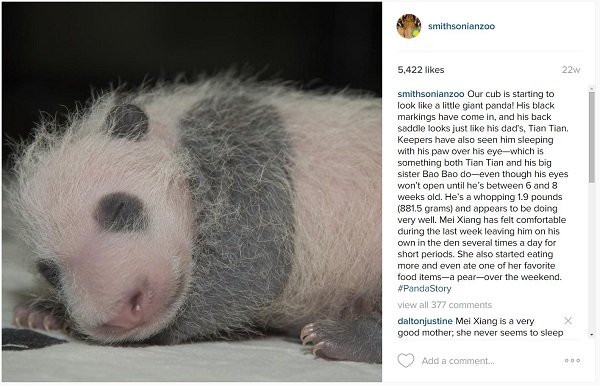2016 Bronze Anvil Award of Commendation Winner Highlight: #PandaStory: ‘Social’ Storytelling and the Science of Saving Species
At the Smithsonian National Zoo and Conservation Biology Institute, there’s the Zoo you see…and the Zoo you don’t. Visitor research has shown that the Zoo’s conservation efforts, science research, and 3,200-acre conservation biology facility weren’t widely known.
The perfect storytellers for both the Zoo you see and the Zoo you don’t are the resident giant pandas. The 2015 breeding season presented a great opportunity for the Communications team to tell behind-the-scenes stories and raise awareness of the Zoo’s conservation and science program.
 Capitalizing on the wide appeal of the pandas, a #PandaStory social media campaign was designed using visual storytelling and Instagram, primarily, to deliver science content and increase engagement with target audiences, in particular millennials.
Capitalizing on the wide appeal of the pandas, a #PandaStory social media campaign was designed using visual storytelling and Instagram, primarily, to deliver science content and increase engagement with target audiences, in particular millennials.
Research analysis of how millenials use social media, and a survey of Washington, D.C. residents, guided the campaign development and plan that focused on:
- Generating mainstream and specialized media coverage of giant panda breeding season scientific milestones directly through #PandaStory social media content
- Increasing Instagram followers and engagement
- Generating global media coverage about the Zoo’s collaboration with China around giant panda conservation.
From April 19, 2015 through January 16, 2016 the Zoo took audiences across the globe behind-the-scenes on a ”Pandatory,‘ delivering science content through social storytelling. Scientific milestones determined the campaign’s storytelling trajectory. Photos and videos were shared with fun and approachable science posts. The voices and perspectives of the Zoo’s “characters" scientists, vets, keepers, and pandas shaped the authentic quality of the storytelling.
Communications staff covered ultrasounds, veterinary exams and broadcast live “for the first time” an artificial insemination of a giant panda on Periscope. The Zoo strategically invited its followers to a part of telling the “Pandatory,” including hosting an Instameet, selecting Instagrammers to be among the first people to see giant panda cub Bei Bei.
To enter, Instagrammers created a 15-second video articulating why they care about pandas and why it's important to study and conserve them. Instagrammers traveled across the country to meet the Zoo’s panda team and observe enrichment and training sessions.
While Zoo scientists used the live-streaming panda cam to monitor behavior, the Communications team invited fans to capture and share their favorite screenshots to drive website traffic. These screenshots were shared weekly as part of Pandatory.
Specialized and traditional media outlets were encouraged to follow the Zoo’s social media accounts for the latest updates throughout the campaign. News releases were distributed announcing the #PandaStory campaign, and staff were trained to message #PandaStory in all their interviews.
To drive coverage of collaboration with the Chinese, the Zoo leveraged the naming of the giant panda cubs to create an event timed with the official State visit of Chinese president Hu Jintao. In collaboration with the White House and the Chinese Embassy, the Zoo invited Michelle Obama and First Lady of the People's Republic of China, Peng Liyuan, to name the cub. This White House press-pooled naming ceremony generated 365 media hits with a potential viewership of 804,339,490.
The Zoo also asked the First Lady to include #PandaStory in her social media posts about the event and provided the only live coverage of the naming ceremony via Periscope.
The campaign’s results exceeded expectations. Specialized outlets that reach millennials, and mainstream media, included science-based content not usually the focus of the Zoo’s giant panda coverage that was pulled directly from #PandaStory posts.
The biggest outlets that included content pulled directly from the posts included CBS News, Buzzfeed, Mashable, Motherboard, and TODAY. Over the course of the campaign there were a total of 4,807 media hits with a potential viewership of 17,112,274,848.
Over the period of the campaign, Instagram followers increased by 109.47% from 34,000 to 71,268. As 90% of Instagram users are under the age of 35, the Zoo’s engagement with millennials grew exponentially during this period. Further, total engagement (583,391) and engagement as percentage of followers (814.5%) confirmed that @SmithsonianZoo followers were commenting, liking and interacting directly with content.
A review of comments during this period confirmed that Instagram audiences found the science content fascinating, fun and informative. The hashtag #PandaStory was used 2,058 times, and had the potential to reach 3,865,933, with 12,322,000 potential impressions. In addition, more than 40,000 panda cam screenshots were shared by followers. From April 19, 2015 to January 16, 2016, there was an 81.58% increase in unique page views over the same period the previous year.
Remarks made by both first ladies underscored collaboration between the U.S. and China and used the panda program as a shining example.
For more information, click here: https://bit.ly/2018anvils

